chacma baboon
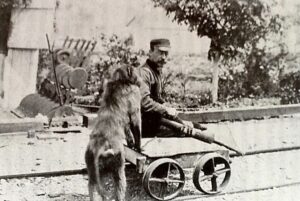 James Edwin Wide had lost both his legs in a work accident years earlier, and so in 1880, when he came across a Chacma Baboon driving an oxcart while visiting a busy South African market, he saw a way to make his life easier. Wide was impressed with the skills, and so he decided to buy him. Having two peg-legs and working had been very difficult on Wide over the years, and finally he saw an end to years of hardship. Impressed by the primate’s skills, Wide bought him, named him Jack, and made him his pet and personal assistant. His original plan was to have Jack drive him on his half-mile commute to the train station. So the first thing he trained the Jack to do was push him to and from work in a small trolley. Soon, Jack was also helping with household chores, sweeping floors and taking out the trash. Jack was very good at his work, and he truly loved Wide, almost as if Wide was his child.
James Edwin Wide had lost both his legs in a work accident years earlier, and so in 1880, when he came across a Chacma Baboon driving an oxcart while visiting a busy South African market, he saw a way to make his life easier. Wide was impressed with the skills, and so he decided to buy him. Having two peg-legs and working had been very difficult on Wide over the years, and finally he saw an end to years of hardship. Impressed by the primate’s skills, Wide bought him, named him Jack, and made him his pet and personal assistant. His original plan was to have Jack drive him on his half-mile commute to the train station. So the first thing he trained the Jack to do was push him to and from work in a small trolley. Soon, Jack was also helping with household chores, sweeping floors and taking out the trash. Jack was very good at his work, and he truly loved Wide, almost as if Wide was his child.
While Jack was very good at his caregiving job, it was at the signal box Jack truly shined. The signal box was a system of manual switches operated in connection with the approaching trains whistles. As trains approached the 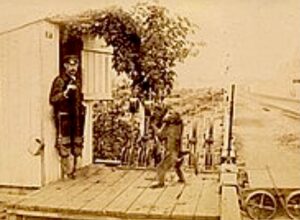 rail switches at the Uitenhage train station, they would toot their whistle a specific number of times to alert the signalman which tracks to change. By watching his owner, Jack picked up the pattern and started tugging on the levers himself. Jack was so smart. He was able to totally take over the signalman’s job that had been held by Wide. Soon, Wide was able to kick back and relax as his furry helper did all of the work switching the rails. According to The Railway Signal, Wide “trained the baboon to such perfection that he was able to sit in his cabin stuffing birds, etc, while the animal, which was chained up outside, pulled all the levers and points.”
rail switches at the Uitenhage train station, they would toot their whistle a specific number of times to alert the signalman which tracks to change. By watching his owner, Jack picked up the pattern and started tugging on the levers himself. Jack was so smart. He was able to totally take over the signalman’s job that had been held by Wide. Soon, Wide was able to kick back and relax as his furry helper did all of the work switching the rails. According to The Railway Signal, Wide “trained the baboon to such perfection that he was able to sit in his cabin stuffing birds, etc, while the animal, which was chained up outside, pulled all the levers and points.”
One day, as the story goes, an upper-class train passenger, looked out the window of the train and saw that a baboon, and not a human, was manning the gears. Of course, this brought outrage, and a complaint to the railway authorities. The authorities decided not to act in haste and fire Wide, decided to resolve the complaint by testing the baboon’s abilities. The result of that test was a group of astounded officials. “Jack knows the signal whistle as well as I do, also every one of the levers,” wrote railway superintendent George B Howe, who visited the baboon sometime around 1890. “It was very touching to see 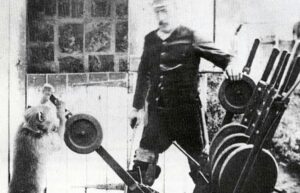 his fondness for his master. As I drew near they were both sitting on the trolley. The baboon’s arms round his master’s neck, the other stroking Wide’s face.”
his fondness for his master. As I drew near they were both sitting on the trolley. The baboon’s arms round his master’s neck, the other stroking Wide’s face.”
The complaint was disregarded and Jack was reportedly given an official employment number, and was paid 20 cents a day and half a bottle of beer weekly. Jack passed away in 1890, after developing tuberculosis. It was a sad day for all who knew him. Jack had worked the rails for nine years, without ever making a mistake. That shows that animals can be trained to do things in a responsible way, and do their job perfectly.
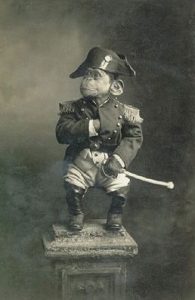
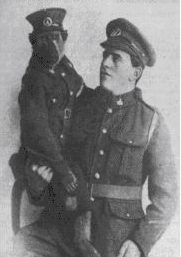 When World War I broke out, many young men were called into service. It is a common part of war…one we all know about, and most parents dread. World War I was unique in one way, however. There was a soldier who went to war who was different. He was not different in the way he served exactly, but rather in some other very obvious ways. His speech was different. His mentality was somewhat different, and his looks were different. I’m not being discriminatory, but simply stating a fact. His name was Jackie, and he was different because he was a monkey, well actually, he was a Chacma baboon (Papio ursinus). Jackie was found in August 1915 near the Marr’s family farm in Villeria, Pretoria, South Africa by Albert Marr and soon became a beloved pet.
When World War I broke out, many young men were called into service. It is a common part of war…one we all know about, and most parents dread. World War I was unique in one way, however. There was a soldier who went to war who was different. He was not different in the way he served exactly, but rather in some other very obvious ways. His speech was different. His mentality was somewhat different, and his looks were different. I’m not being discriminatory, but simply stating a fact. His name was Jackie, and he was different because he was a monkey, well actually, he was a Chacma baboon (Papio ursinus). Jackie was found in August 1915 near the Marr’s family farm in Villeria, Pretoria, South Africa by Albert Marr and soon became a beloved pet.
When the war started and the young men were drafted, Albert was no exception. The thing is that Albert couldn’t stand the thought of leaving his beloved pet at home. Albert was assigned to service at Potchefstroom in the North West province of South Africa as private number 4927 for the newly formed 3rd Transvaal Regiment of the 1st South African Infantry Brigade on the 25th August 1915. He approached his superiors and requested that Jackie be allowed to go with him and amazingly was given permission. I’m sure that seems as odd to you as it did to me, but it goes further. Once enlisted Jackie was given a special uniform complete with buttons, a cap, regimental badges, a pay book and his own rations. He was a true member of the regiment, but that doesn’t mean he was accepted as a part of it…at first anyway. The other members of the regiment initially ignored Jackie, but like most people around a monkey, or in this case, baboon, it was hard to ignore him for very long. Jackie soon became the official mascot of the 3rd Transvaal Regiment. Jackie took his duties very seriously, however. He wasn’t there just to eat and fool around!
Jackie was very smart, and when he saw a superior officer passing, he would stand to attention and even provide them with the correct salute. He would light cigarettes for his comrades in arms and was, without a doubt, the best sentry around, due to his great senses of hearing and smelling which allowed him to be able to detect any enemy long before any of his other army mates could even notice their approach. He wasn’t a coddled pet protected for the battles either. Jackie spent three years in the front line amongst the trenches of France and Flanders in Europe. During the Senussi Campaign on 26 February 1916 in Egypt, Jackie’s beloved Albert got wounded on his shoulder by an enemy bullet. Jackie stayed beside him until the stretcher bearers arrived, licking the wound and doing what he could to comfort his friend.
Albert and Jackie both held the rank of private, and in April of 1918, both got injured in the Passchendaele area in Belgium during a heavy fire. With explosions surrounding them, Jackie was seen trying to get some protection by building a little fortress of stones around himself. He didn’t manage to finish his little safe area soon enough, and was hit by a chunk of shrapnel from a shell explosion nearby, which also injured Albert. Jackie’s right leg was seriously wounded and later had to be amputated. Jackie and Albert both made a full recovery and shortly before the armistice, Jackie was promoted to corporal, and awarded a medal for valor.
At the end of April, Jackie was officially discharged at the Maitland Dispersal Camp, Cape Town, South Africa, while wearing on his arm a gold wound stripe and three blue service chevrons indicating three years of frontline service. He was given a parchment discharge paper, a military pension and a Civil Employment Form for 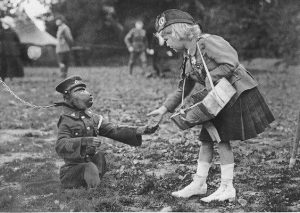
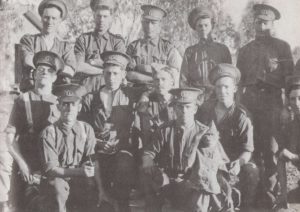 discharged soldiers. After his service, Jackie returned to the Marr’s farm where he lived until May 22, 1921…a sad day for all who knew him. Albert Marr lived until the age of 84 and died in Pretoria in August 1973. Jackie was an amazing Chacma Baboon who, because of a fateful connection, ended up as the only monkey to reach the rank of Corporal of the South African Infantry and fight in Egypt, Belgium and France during World War I. Now that’s amazing!!!
discharged soldiers. After his service, Jackie returned to the Marr’s farm where he lived until May 22, 1921…a sad day for all who knew him. Albert Marr lived until the age of 84 and died in Pretoria in August 1973. Jackie was an amazing Chacma Baboon who, because of a fateful connection, ended up as the only monkey to reach the rank of Corporal of the South African Infantry and fight in Egypt, Belgium and France during World War I. Now that’s amazing!!!

